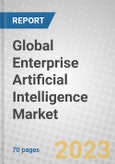Chapter 2 Summary and Highlights
Chapter 3 Market Overview
- Overview
- Enhanced Customer Service
- Maximized Sales
- Fortified Cybersecurity
- Optimized Supply Chains
- Task Automation
- Existing Products Upgradation
- Market Dynamics
- Market Drivers
- Market Restraints
- Market Challenges
- Future of Enterprise Ai
- Rise of Ai in Business Development
- Macroeconomic Factors
- Impact of Covid-19 on the Market
Chapter 4 Market Opportunities
- Growing Demand for Improving Business Functions
- Increasing Partnership Among Market Leaders
Chapter 5 Market Breakdown by Component, Technology, and End-user
- Global Enterprise Ai Market, by Component
- Solutions
- Services
- Global Enterprise Ai Market, by Technology
- Natural Language Processing (Nlp)
- Machine Learning
- Computer Vision
- Others
- Global Enterprise Ai Market, by End-user
- Retail
- Bfsi
- Manufacturing
- Healthcare
- It and Telecom
- Others
Chapter 6 Market Breakdown by Region
- Overview
- North America
- Europe
- Asia-Pacific
- Rest of the World
Chapter 7 Esg Developments
- Key Esg Issues in the Ai Industry
- Carbon Footprint/Environmental Impact
- Electricity
- Ai Industry Esg Performance Analysis
- Environmental Performance
- Social Performance
- Governance Performance
- Case Study
- Concluding Remarks
Chapter 8 Competitive Landscape
- Introduction
- Global Market Rankings
- Google LLC
- Ibm Corp.
- Microsoft Corp.
Chapter 9 M&A and Fundings Outlook
- M&A Analysis
- Startup Fundings in Enterprise Ai
Chapter 10 Company Profiles
- Amazon Web Services, Inc.
- C3.Ai, Inc.
- Datarobot Inc.
- Google LLC
- Hewlett Packard Enterprise (Hpe)
- Ibm Corp.
- Intel Corp.
- Microsoft Corp.
- Nvidia Corp.
- Oracle Corp.
- Sap Se
List of Tables
Summary Table: Global Market of Enterprise AI, by Region, Through 2028
Table 1: Patnerships Among Market Leaders for Enterprise AI, 2022 and 2023
Table 2: Global Market for Enterprise AI, by Component, Through 2028
Table 3: Global Market for Enterprise AI, by Technology, Through 2028
Table 4: Global Market for Enterprise AI, by End User, Through 2028
Table 5: Global Market for Enterprise AI, by Region, Through 2028
Table 6: North American Market for Enterprise AI, by Component, Through 2028
Table 7: North American Market for Enterprise AI, by Technology, Through 2028
Table 8: North American Market for Enterprise, by End User, Through 2028
Table 9: European Market for Enterprise AI, by Component, Through 2028
Table 10: European Market for Enterprise AI, by Technology, Through 2028
Table 11: European Market for Enterprise AI, by End User, Through 2028
Table 12: Asia-Pacific Market for Enterprise AI, by Component, Through 2028
Table 13: Asia-Pacific Market for Enterprise AI, by Technology, Through 2028
Table 14: Asia-Pacific Market for Enterprise AI, by End User, Through 2028
Table 15: RoW Market for Enterprise AI, by Component, Through 2028
Table 16: RoW Market for Enterprise AI, by Technology, Through 2028
Table 17: RoW Market for Enterprise AI, by End User, Through 2028
Table 18: Environmental Metrics for AI Industry
Table 19: Social Metrics for AI Industy
Table 20: Governance Metrics for AI Industy
Table 21: Market Share of Top 3 Players in Enterprise AI Industry, 2022
Table 22: Mergers and Acquisitions, Global Enterprise AI Market, Jul. 2019-Sept. 2022
Table 23: Startup Fundings in Enterprise AI, January 2019-December 2022
Table 24: Amazon Web Services, Inc.: Product Offerings
Table 25: C3.ai, Inc.: Product Offerings
Table 26: DataRobot Inc.: Product Offerings
Table 27: Google LLC: Product Offerings
Table 28: Google LLC: Recent Developments, 2023
Table 29: Hewlett Packard Enterprise (HPE): Product Offerings
Table 30: IBM Corp.: Product Offerings
Table 31: IBM Corp.: Recent Developments, 2023
Table 32: Intel Corp.: Product Offerings
Table 33: Microsoft Corp.: Product Offerings
Table 34: Microsoft Corp.: Recent Developments, 2023
Table 35: Nvidia Corp.: Product Offerings
Table 36: Nvidia Corp.: Recent Developments, 2023
Table 37: Oracle Corp.: Product Offerings
Table 38: Oracle Corp.: Recent Developments, 2023
Table 39: SAP SE: Product Offerings
List of Figures
Summary Figure: Global Market Shares of Enterprise AI, by Region, 2022
Figure 1: Benefits of Enterprise AI
Figure 2: Global Market Shares of Enterprise AI, by Component, 2022
Figure 3: Global Market Shares of Enterprise AI, by Technology, 2022
Figure 4: Global Market Shares of Enterprise AI, by End User, 2022
Figure 5: Global Market Shares of Enterprise AI, by Region, 2022
Figure 6: North American Market Shares of Enterprise AI, by Component, 2022
Figure 7: North American Market Shares of Enterprise AI, by Technology, 2022
Figure 8: North American Market Shares of Enterprise AI, by End User, 2022
Figure 9: European Market Shares of Enterprise AI, by Component, 2022
Figure 10: European Market Shares of Enterprise AI, by Technology, 2022
Figure 11: European Market Shares of Enterprise AI, by End User, 2022
Figure 12: Asia-Pacific Market Shares of Enterprise AI, by Component, 2022
Figure 13: Asia-Pacific Market Shares of Enterprise AI, by Technology, 2022
Figure 14: Asia-Pacific Market Shares of Enterprise AI, by End User, 2022
Figure 15: RoW Market Shares of Enterprise AI, by Component, 2022
Figure 16: RoW Market Shares of Enterprise AI, by Technology, 2022
Figure 17: RoW Market Shares of Enterprise AI, by End User, 2022
Figure 18: Mergers and Acquisitions in Enterprise AI Market, by Deal Size, 2019-2022
Figure 19: Distribution Share of Mergers and Acquisitions in Enterprise AI Market, by Region, 2020-2022
Figure 20: Startup Fundings in Enterprise AI, by Funding Round, 2022
Figure 21: Share of Startup Funding Amounts in Enterprise AI, by Various Rounds, 2022








